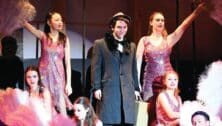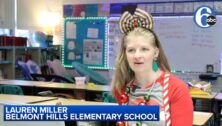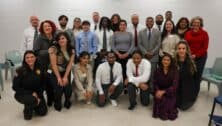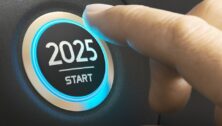Delaware County Leadership: Dr. Benjamin Rusiloski, President, Delaware Valley University
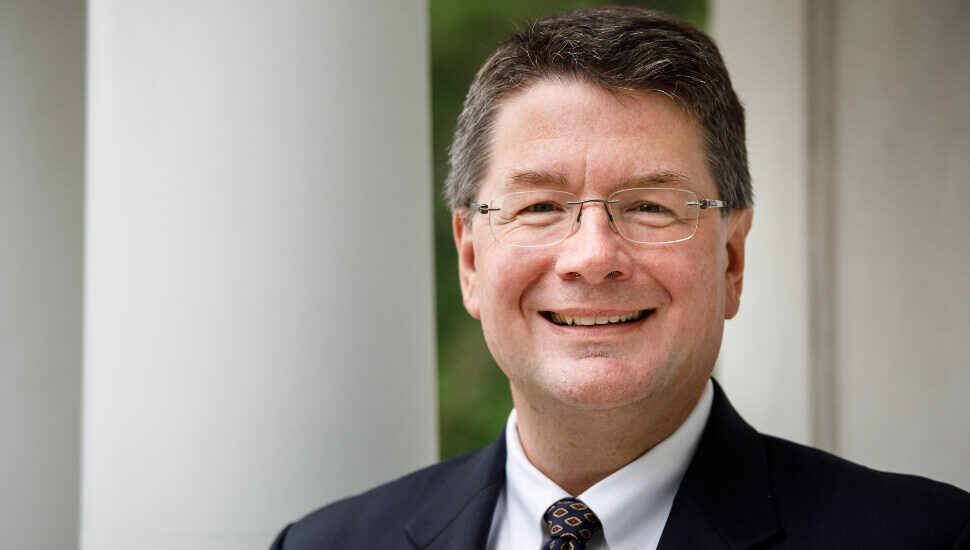

Dr. Benjamin Rusiloski, the president of Delaware Valley University, spoke with DELCO Today about his early love for science and math that took him from being a statistician for his high school sports teams to becoming a chemistry professor. He also discussed growing up with parents who instilled a lifelong love of education and the many influential mentors he’s had throughout his life.
Dr. Rusiloski explained how Delaware Valley University has created innovative experiential learning programs through partnerships with local businesses, a model that’s received national recognition. He also spoke about the importance of a small, personalized education experience and the inspiration he gets from working with motivated, determined young people.
Where were you born and where did you grow up?
My mom was from Vermont, but my dad was from northeastern Pennsylvania. I was born in Bennington, Vermont, but when I was a couple of years old, we moved to Mountain Top, Pennsylvania and that’s where my three sisters were born. I’m the oldest of four and the only son.
What did your parents do?
My father was a high school teacher and coach and athletic director. My mom went back to college when we four kids were all in school. She pursued a degree in nursing and healthcare management through our local community college in Wilkes-Barre.
It was really good for me to see that she was doing that and my dad was going for his master’s degree. It made me appreciate what non-traditional students go through – the sacrifices they make and life balance.
Did you play any sports when you were growing up?
I did when I was really young, but I have to admit I was not such a gifted athlete.
You would think you would have been drawn into it because your father was the athletic director.
Well, fortunately, I had three sisters who were very athletic. They took the heat off me athletically. From an early age, I loved math, I loved science, and I ended up being the statistician for a couple of the teams during junior high and high school.
Did you have any other extracurricular activities besides being the statistician for those teams?
I was in a couple of theater productions at my school, and I also was very active in the Pennsylvania Junior Academy of Science. Every year in junior high and high school, I would work through the year on a science project. I was fortunate that my high school chemistry teacher and one of my high school mathematics teachers played a big role in helping me to see a career trajectory for me in the sciences.
What do you think those two teachers saw in you as a high schooler?
I think probably a curiosity about science, why things work the way they do, and a fascination with the things we see being an outcome of the things we can’t see. And I think they saw that I had a desire or an ability to help students with math and chemistry, which are challenging subjects. It led me down a path in teaching and a career in education.
So did teaching come first, or did leadership?
The teaching probably came first for me. My father was certainly a model for me as a teacher in terms of his interactions with students, both in and out of the classroom. He showed me the impact that people have in education, not just the day-to-day in the classroom, but the life lessons that are taught – particularly if you’re involved as a coach or an advisor.
My chemistry and math teachers, Mrs. Minnier and Mrs. Madden, also inspired me with the way they were able to present very complicated subjects.
When did the leadership kick in? You’re a natural teacher – were you a natural leader?
It started in high school – I was an officer with the student council. I also was an officer in the math club and the science club and was also pretty active in the Key Club.
But as much as I enjoyed bringing people together and setting common goals, I don’t know that I looked at myself as much of a leader then as I did a facilitator.
Did you have any jobs in high school that stand out?
Through high school and college, from age 14 to 21, I worked as a busboy and then a server for two different restaurants owned by the same family in the Hazleton area. That taught me the importance of relationships with people and meeting the needs of people. It helped me to see how different parts of an organization have to work together. When I got into college, I worked all four years as a laboratory assistant.
I have been blessed with mentors my entire life – my grandparents, my parents, Mrs. Minnier, Mrs. Madden, and professors in college and graduate school. There are people in that restaurant business whom I served for those seven years, some of whom I’m still in touch with today, who provided guidance to me at different moments along the way. You not only learn how to work with people and how to deal with people, but every step of the way, you’re going to find nuggets, relationships that you’re going to carry forward.
What about music? What were you listening to growing up and in college?
I like all kinds of music, but I listen a lot to music from the late 70s and the 80s. In high school, I was listening to Boston, Journey, Asia – still great music.
But with young kids, you end up listening to a lot of the current stuff, so I know Taylor Swift, and Selena Gomez. Each generation’s got their own thing, so you have to respect that.
My mom still likes to listen to music from the 50s and 60s, and I know a lot of those songs from her playing her LPs when I was growing up. You learn about people and the culture of the time period by the music they listen to – what resonated and what the messages were.
It’s a powerful art form. So, how did you decide where to go to college?
To be honest with you, I really only looked at King’s College. For one, I had developed some relationships there while working on these science projects in high school. Those two high school teachers I worked with had a strong connection with someone in the chemistry faculty at King’s. His name was Dr. Frederick Sauls. I wanted an experience that was going to be very personalized, where faculty would serve as not only instructors but mentors. And the other thing is my dad graduated from King’s.
I had a good experience, not only in chemistry but there was another faculty member, Ms. Gloria Galante, who was a dean by the time I left. King’s had a very comprehensive core curriculum and I actually minored in English because I was drawn in by her classes. She said to me, “Scientists aren’t always the best communicators.” She really instilled in me the importance of balancing effective communication (both oral and written) with scientific theory. She also taught me the importance of being able to explain complicated concepts in simple terms, which helped me to be a better teacher.
What did you do after you graduated?
My last two summers at King’s, Dr. Sauls got me connected with an internship opportunity in a lab at Rensselaer Polytechnic Institute in Troy, NY. It gave me the opportunity to prove to myself that I could do graduate-level work. Because of those experiences, I began to apply to graduate schools. I was looking for schools that had, even at the graduate level, that smaller, personalized experience. At the time, for me, that fit was Duke University.
Duke was a cultural shift for you?
Totally different. I was going to an environment where there were, at the time, roughly 10,000 students total, undergraduate and graduate, coming from an environment where there were maybe 2,000 students total. Fortunately, I found a research advisor there – his name was Dr. Donald Chesnut – and the first-year chemistry faculty member, Dr. James Bonk. I ended up joining Dr. Chesnut’s research group in physical chemistry and I worked as a teaching assistant for Dr. Bonk.
You mentioned earlier that you’ve been blessed with mentors throughout your life. Who were the three most important mentors that you’ve had?
My parents. Incredible work ethic gave each of us confidence in ourselves to be whoever we wanted to be. They had a focus on lifelong education.
And then I would say Ms. Galante, my English professor because she helped me see the balance between science and communication.
And then I would say – it’s almost a tie, but I’d probably give the nod to Dr. Bonk. The reason for that is the time he invested in me and teaching students outside of the classroom.
So how did you end up at Delaware Valley University?
My last year in graduate school, I began to look at small institutions that focused on knowing students, the student experience, mentoring, and that experience outside the classroom. I began to look up and down the East Coast, with the goal of getting back to Pennsylvania. At the end of the day, I had a choice between a school in West Virginia and a school in Pennsylvania, and that was DelVal. It’s not only that it was closer to home. DelVal, from the moment I stepped on the campus, felt like home.
When I got here, I was the first hire in the chemistry department in about 20 years, and people took me under their wing. I learned something from every individual who was here at that time. The chair of the department at that time, Dr. Robert Orr, after working with him for a couple of years, said, “Ben, you’re going to be the next chair of this department.” He got me thinking about what it meant to be a leader in education.
So here we are halfway through 2022. What are your priorities and opportunities that you’re focused on?
Our priorities really focus on offering market-driven programs that speak to significant career outcomes, where real-world experience is part of the education. When I talk about market-driven, I’m talking not only about student interest but also employer and graduate, and professional school needs. That’s one thing we’re really committed to here, looking at the overall outcomes that our students are able to achieve.
A big part of that is through our experiential learning program, E360. That program has gotten to the point now that 100% of our students have real-world experience when they graduate. The program has received national recognition over the past few years and has become a model for other schools.
The other thing we’ve got going at DelVal that’s very unique is our One Health initiative. It looks at the connection between the plant world, the animal world, the environment, and human health. It really enables us to become a thought leader, not only on the individual pieces but the intersection as well. We’ve also partnered with Doylestown Health – it doesn’t get more hands-on or experiential than clinical healthcare.
So DelVal has deep roots in agriculture but forward thinking as well with the healthcare and the business side of it, the engineering side.
Absolutely. And we’re very interested in partnerships that check multiple boxes. I’ll give you an example. Today, we formally announced our relationship with Terrain under the URBN umbrella. We are going to have a Terrain location here at DelVal by next summer. They’re going to move into our former farm market and they’re going to employ our students as part of our E360 program. They’re also going to be utilizing our products – fruits, vegetables, meats – at the store and also on the rotating menu they’ll have in the café. There will be opportunities for students in sales and retail management, landscape architecture, plant science, and animal science. I think it’s going to get a lot of attention, given that it’s a unique partnership between a university and a company like Urban.
We’ve got a very valuable asset here in the land we have – DelVal has over 1,000 acres of land between its three properties. We have to look at ways we can develop partnerships that take that land asset and help us to use it to support teaching and learning and help us to develop complementary revenue streams.
Another big initiative we’ve got on campus right now is working with several poultry companies to develop a poultry science center on campus that will have both a production side and a research side.
What do you like to do in your free time, Ben?
The most important thing to me is my family. My wife and I have been blessed with three children. I have an adult daughter who’s a graduate of DelVal and works in Charles River Labs in Horsham. She’s a chemist and she lives only a mile from us in Doylestown, so we see her frequently.
And then we’ve got a 15-year-old daughter and a 13-year-old son. We are totally in spectator sport mode, watching them as they play their three different sports each during the year.
The other thing we like to do is get up to our family’s place in Vermont. That’s really the place where I rejuvenate and connect with my roots. The mountains, the air, walking the same areas that my great-grandparents, my grandparents walked – there’s something about it that keeps you grounded.
Do you read much?
Yeah, but, unfortunately, it’s become a lot less frequent. I used to be a big John Grisham, Tom Clancy fan. Now it’s more reports, compliance audits, and whatnot. I still try to read a lot of news. I’ve got a couple of books sitting on the bedside table right now on higher education and looking at emerging trends. I do like a good biography.
One thing I’ve learned from reading biographies and watching leaders, whether they’re U.S. presidents, U.S. senators, or CEOs – the common theme I see is that there are always multiple sides to what you’re seeing and hearing. People are doing the best they can at that moment with what they have and the situation with which they’re faced.
What gives you hope, Ben?
It’s looking at, in particular in recent years, the resilience I’ve seen in all three of my children and the 2,000-plus students for whom I have responsibility for here. How they’ve adapted. They’ve been creative. They’ve never given up. They never let the obstacles of the pandemic or other economic situations deter them from their goals.
I think it’s one of the great benefits about being in an environment where you’re around aspiring young adults who are very determined to make a difference in the world.
Last question for you – what’s the best piece of advice you ever received?
Two things – both are from my mom and dad. Dad always used to say, “You never walk away from what brought you to the table.” It’s one of the reasons that I still teach first-year chemistry every semester because it keeps me connected to why we’re here – supporting the students but also supporting the faculty and staff.
And then Mom always said to me, “No matter what, take the high road.” And then she’d wink and say, “Because there’s a lot less traffic.” I always think of that when I’m faced with a challenge, whether it’s in the professional world or the personal world – always take the high road.
Join Our Community
Never miss a Delaware County story!
"*" indicates required fields
























![95000-1023_ACJ_BannerAd[1]](https://delco.today/wp-content/uploads/sites/3/2023/03/95000-1023_ACJ_BannerAd1.jpg)



